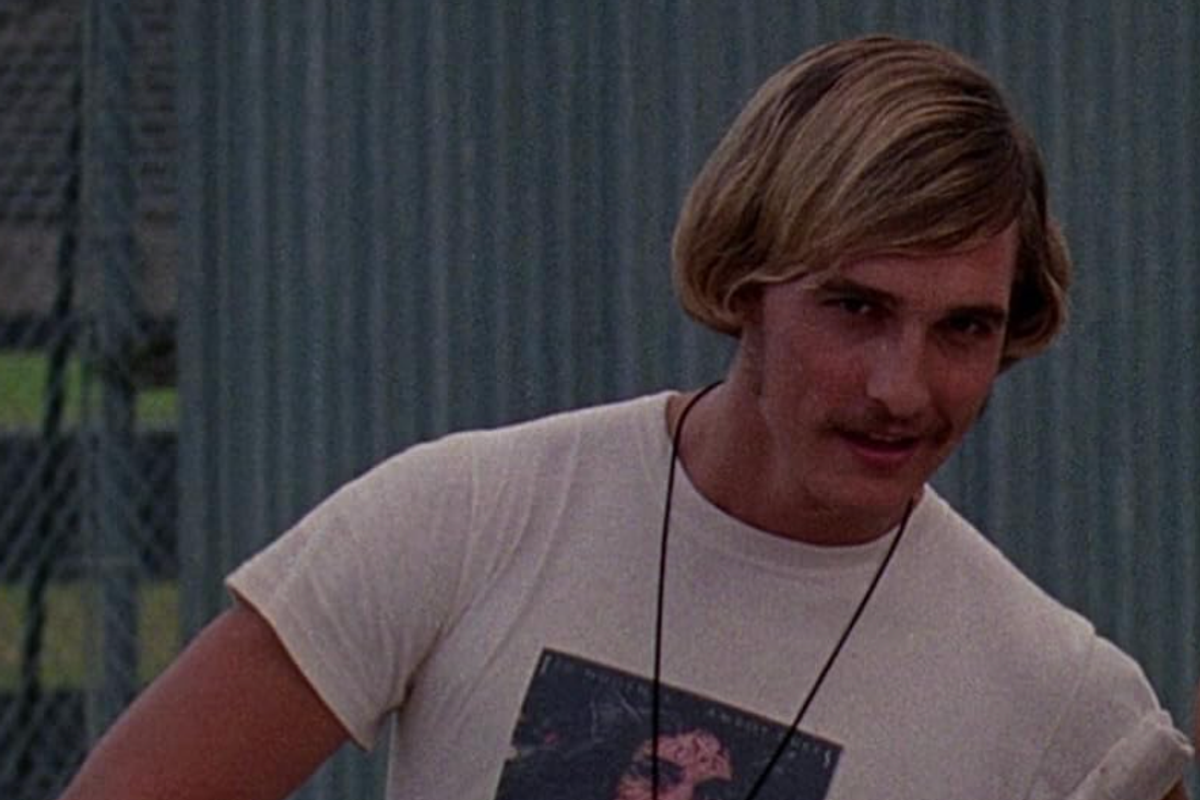Matthew McConaughey says an iconic memory of his brother inspired one of his most beloved characters
"He was my hero."
Matthew McConaughey in Dazed and Confused (1993)
One might not call David Wooderson from Dazed and Confused a wholesome character. Iconic? Timelessly quotable and effortlessly cool? Sure. But wholesome? That’s a stretch. And yet, the childhood memory that helped Matthew McConaughey create that star-making role is just that: wholesome.
While appearing on the Jan. 7 episode of the Where Everybody Knows Your Name podcast hosted by Ted Danson and Woody Harrelson, McConaughey shared how he actually landed the role, and it’s about as classic a Hollywood story as you can get.
Apparently, one of McConaughey's film school classmates worked as a bartender for the rooftop bar at the Hyatt. One night, McConaughey went to visit this friend, who informed him that casting director Don Phillips was sitting close by.
McConaughey went over to talk to Phillips, and the two hit it off. Perhaps a little too well, because, McConaughey recalls, “Three and half hours later, we get kicked out” after a conversation about golf led to Phillips hopping onto a table to demonstrate his swing.
- YouTube www.youtube.com
While sharing a cab home, Phillips asked McConaughey, “Hey, you ever done any acting?” to which he answered honestly: “I said, ‘Yeah, I was in a Miller Light commercial. I don't know if you consider that acting. Maybe it was more of a modeling job.’ ”
Still, Phillips thought he “might be right” for the role of Wooderson in a Richard Linklater coming-of-age film titled Dazed and Confused. Knowing only that the character was someone “out of high school, but he still likes the high school girls,” McConaughey showed up at 9:30 a.m. the next morning to a script and a handwritten note that read, “Hey, Matthew, great night last night. I read this part. You might be right for it.”
Skimming the script, McConaughey found that now-immortal words, “That's what I love about them high school girls, man. I get older, but they stay the same age.” He instantly knew that was a “launchpad line.”
@binge We all know a Wood. #DazedAndConfused #matthewmcconaughey #davidwooderson #creep #predator #highschool #comingofage #1993 #1970s #richardlinklater #movie #moviescene #moviescenes #movies #scene #scenes #BINGE #ISawItOnBINGE ♬ original sound - BINGE
During the two weeks leading up to the audition while McConaughey was “trying to figure” the true spirit of his character, he was struck by a memory of picking up his older brother Pat from school with his mom while his car was at the shop.
“We're driving through the campus and I'm looking out the back end of that wood-paneled station wagon. I'm looking for Pat. . . . And as we’re going by, about 200 yards away, I see this shadowed figure leaning against the shady wall in the smoking section,” McConaughey recalled.
He continued, “I can see the ember of this lazy finger cigarette hanging on these two hands. This guy's leaning against the wall with his left leg, boot heel up against the wall, smoking. And I went, it’s my brother.” Not wanting his big brother to get in trouble for smoking, little McConaughey let his mother keep driving. Somehow, Pat got home on his own.
“In my 10-year-old eyes, my 17-year-old brother, who was my hero, in that shot from 200 yards away, he was cooler than James Dean. He was 9 feet tall. He was the coolest man. Now, that's who I based Wooderson on,” McConaughey gushed. “That wasn't who my brother was, but that, in my 10-year-old eyes, that's who it was.”

From that point, McConaughey had a solid anchor. When he showed up for the audition, he was ready. He even improvised everyone’s favorite “Alright, alright, alright” line. When Harrelson and Danson asked if McConaughey ever tires of people saying it to him, he replied with an adamant, “Hell no.”
It’s always amazing to hear what tiny spark sets off someone’s creativity, isn’t it? What a great reminder that life provides an endless supply of inspiration.
Watch the full episode of Where Everybody Knows Your Name below:
- YouTube www.youtube.com

